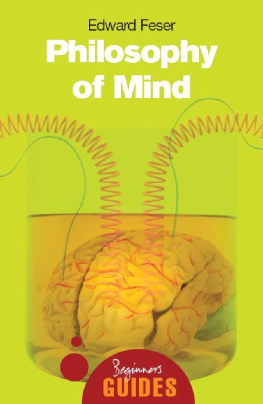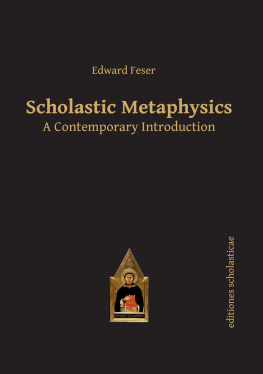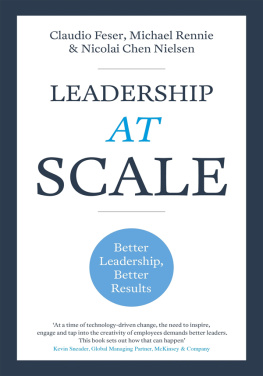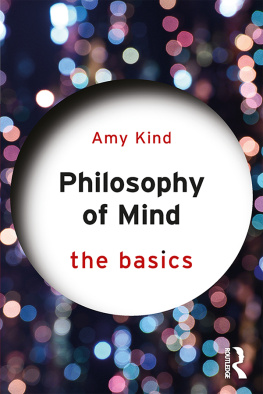Philosophy of Mind
A Beginners Guide
ONEWORLD BEGINNERS GUIDES combine an original, inventive, and engaging approach with expert analysis on subjects ranging from art and history to religion and politics, and everything in between. Innovative and affordable, books in the series are perfect for anyone curious about the way the world works and the big ideas of our time.
africa | fair trade |
anarchism | feminism |
aquinas | forensic science |
artificial intelligence | french revolution |
the bahai faith | genetics |
the beat generation | global terrorism |
biodiversity | hinduism |
bioterror & biowarfare | history of science |
the brain | humanism |
british politics | islamic philosophy |
the buddha | journalism |
cancer | judaism |
censorship | lacan |
christianity | life in the universe |
civil liberties | literary theory |
classical music | machiavelli |
climate change | mafia & organized crime |
cloning | magic |
cold war | marx |
conservation | medieval philosophy |
crimes against humanity | middle east |
criminal psychology | NATO |
critical thinking | nietzsche |
daoism | the northern ireland conflict |
democracy | oil |
descartes | opera |
dyslexia | the palestineisraeli conflict |
energy | particle physics |
engineering | paul |
the enlightenment | philosophy of mind |
epistemology | philosophy of religion |
evolution | philosophy of science |
evolutionary psychology | postmodernism |
existentialism | psychology |
shakespeare | quantum physics |
the small arms trade | the quran |
sufism | racism |
volcanoes | renaissance art |

Philosophy of Mind
A Beginners Guide
Edward Feser

A Oneworld Book
Published by Oneworld Publications 2005
Reissued 2006
Reprinted 2008, 2010
This ebook edition published by
Oneworld Publications 2011
Copyright Edward Feser 2006
All rights reserved
Copyright under Berne Convention
A CIP record for this title is available
from the British Library
ISBN 9781780740416
Typeset by Jayvee, Trivandrum, India
Cover design by Two Associates
Oneworld Publications
185 Banbury Road
Oxford OX2 7AR
England
Learn more about Oneworld. Join our mailing list to find out about our latest titles and special offers at:
www.oneworld-publications.com/newsletter.htm
Preface and acknowledgments
Can science explain consciousness? Is the mind nothing but the brain? Do you have an immaterial and immortal soul, inaccessible to science and knowable only via metaphysical inquiry? Is there an ultimate and absolute difference between man and machine? Can computers think? Could there be conscious robots? These are some of the questions we will be dealing with in this book. They are among the central issues in the philosophy of mind, a field that has in recent years become perhaps the most active of the various sub-disciplines within philosophy.
It is difficult to say anything in philosophy without saying everything. Philosophical issues and arguments are so deep and complex that when you begin to examine any one of them, you will soon find that it is near impossible to come to a settled conclusion without also examining many others. This is perhaps even truer of the philosophy of mind than it is of other branches of philosophy: to inquire into the nature of the mind and its relationship to the body is to set out on a course of study that leads almost immediately to general questions in metaphysics and epistemology, and eventually even to topics in the philosophy of language, the philosophy of science, and the philosophy of religion. This, as the reader will soon discover, is one of the themes of this book. An introduction to the philosophy of mind cannot fail to be to some extent an introduction to philosophy in general. The book is, nevertheless, an introduction: no prior knowledge of the subject is needed in order to understand it; and though we will occasionally address certain technical issues, these have been kept to a minimum, and been made as reader-friendly as possible.
Another theme of the book is the continuing relevance and power of non-materialistic approaches to the philosophy of mind. To be sure, materialism the view that the mind can be fully accounted for in terms of purely physical processes of the sort studied by the natural sciences is today the dominant tendency in the field. But this is, perhaps surprisingly, a very recent development. Until the 1960s, materialism was a minority view among philosophers interested in the nature of the mind, even among philosophers like C.D.Broad, Karl Popper, and Bertrand Russell who understood and greatly admired modern science and who were irreligious, or even anti-religious, in outlook. While there are important and challenging philosophical arguments in favor of materialism, there are also equally important and challenging arguments against that view; and in fact, arguments of the latter sort are the ones that most philosophers, for most of the history of philosophy, have found the most convincing. It is possible, of course, that the majority view in the history of the subject was erroneous, and that the currently orthodox approach is the right one; but it is also possible that the historically dominant view was correct, and that contemporary philosophers have made a mistake in departing from it. Philosophy, in any case, is not about believing what is fashionable, but about discovering what is true. It is crucial, then, if one is properly to understand the philosophy of mind, that one be as familiar with the chief arguments of the anti-materialist side as one is with the arguments for materialism. This book aims, accordingly, to provide a solid introduction both to the traditional arguments against materialism and to the contemporary arguments in favor of it. This is all the more important given that even today, critics of materialism constitute a large and influential minority position within the field. It is time an introduction to the subject reflected this fact, and avoided the excessive materialist bias that has become all too common in introductory volumes. I have tried to be fair to both sides, and I hope the reader will find that I have succeeded.
Next page














